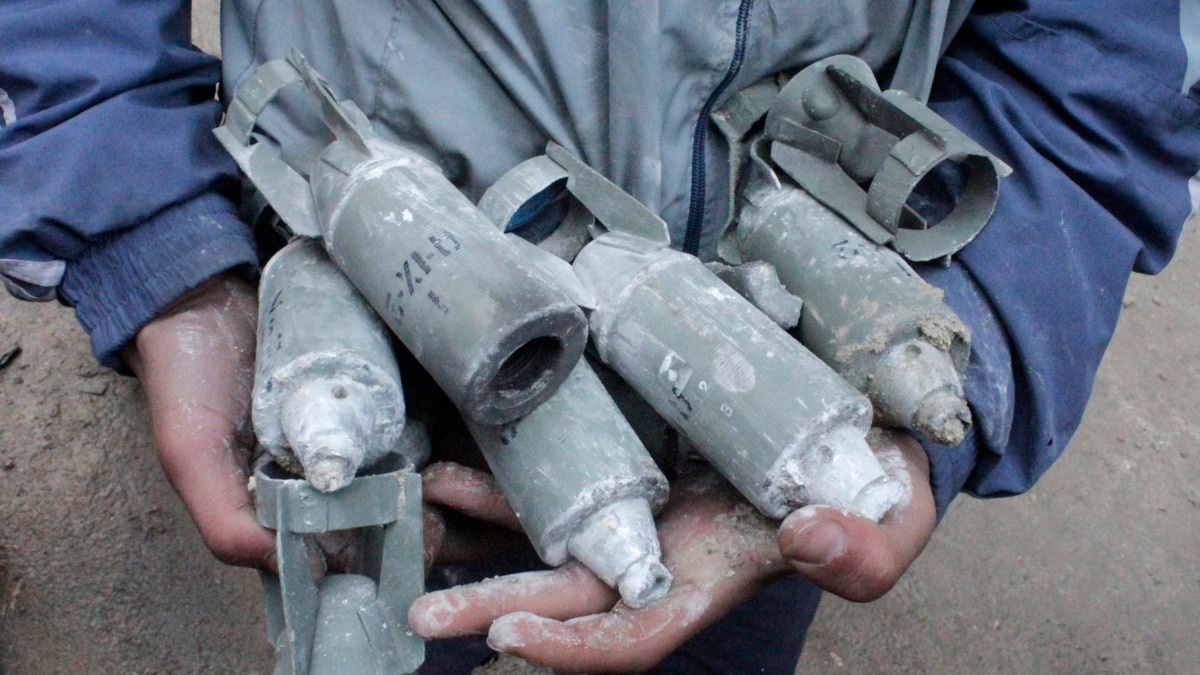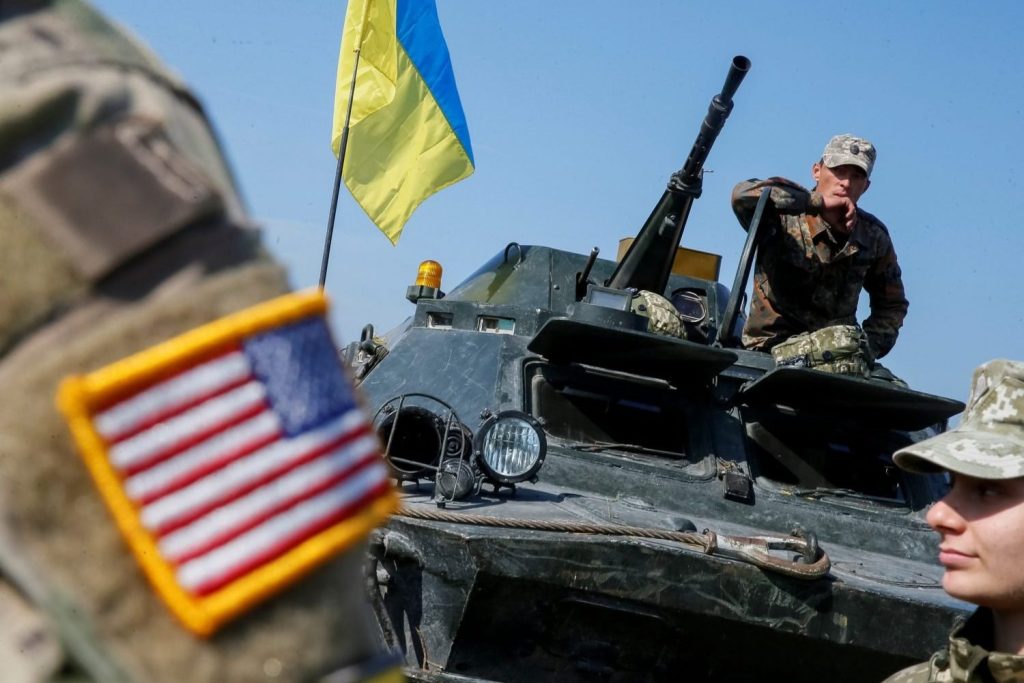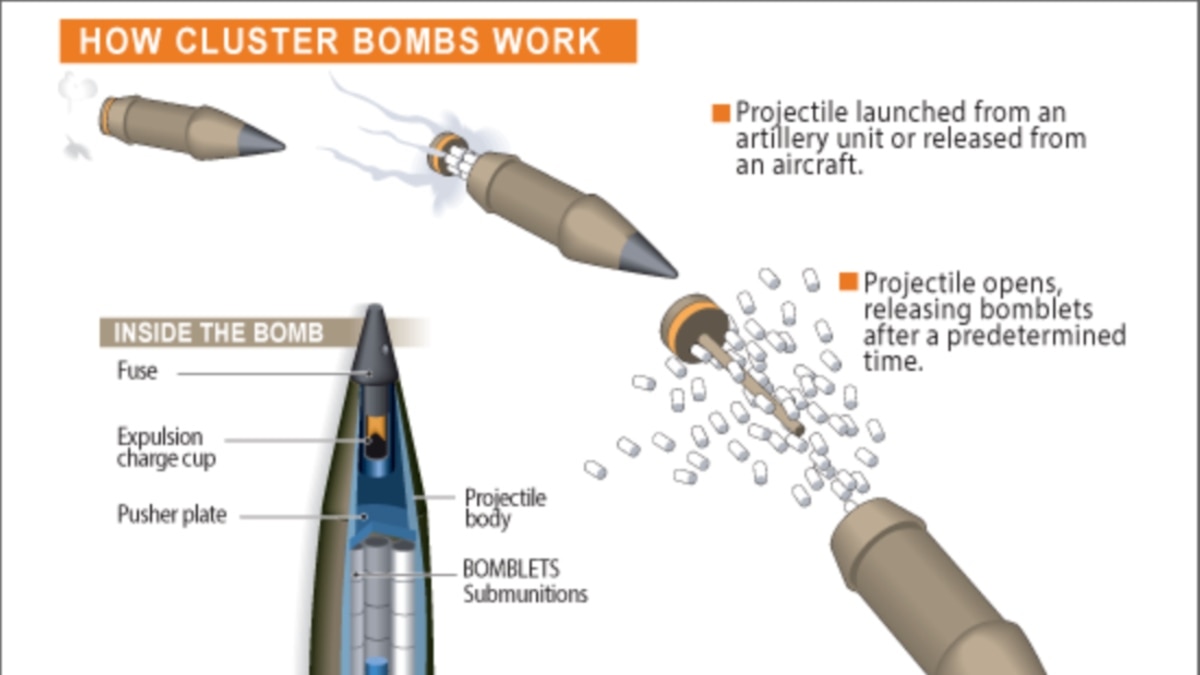News
Biden to Supply Ukraine With Banned Cluster Munitions
The US Pentagon stated Friday that it will supply cluster munitions to Ukraine for the first time, as Kyiv’s soldiers face difficult fighting in their counteroffensive against invading Russian troops.
Due to the danger that unexploded bomblets offer to civilians, the action sparked harsh criticism from rights groups, but Washington claimed it had gotten assurances from Kyiv that it would minimise harm to civilians, notably by not employing the explosives in inhabited areas.
President Joe Biden told CNN that providing the bombs was “very difficult,” but Ukrainian forces were “running out of ammunition.”
“They either have the weapons to stop the Russians now, preventing the Ukrainian offensive through these areas, or they don’t.” “And I believe they were needed,” he added.
The Pentagon claimed in a statement Friday that a new military aid package released Friday includes “dual-purpose improved conventional munitions,” alluding to cluster munitions bombs.
Ukrainian President Volodymyr Zelensky quickly expressed his appreciation for the “much-needed” assistance, tweeting that “the expansion of Ukraine’s defence capabilities will provide new tools for the de-occupation of our land and bringing peace closer.”
Massive risk of civilian harm
According to US National Security Advisor Jake Sullivan, there is “a massive risk of civilian harm if Russian troops and tanks roll over Ukrainian positions and take more Ukrainian territory and subjugate more Ukrainian civilians because Ukraine does not have enough artillery.”
“Kyiv has provided written assurances that it will use these in a very careful manner,” he added, adding that Ukraine’s government “has every incentive to minimise risk to civilians, because they are their citizens.”
Ukraine promised not to deploy the rounds in civilian-populated areas and to record where they were used to aid demining work after the war, according to US Undersecretary of Defence Colin Kahl.
The US would also not give cluster munitions with a “dud rate” of more than 2.35 percent, according to Kahl, comparing this with Russia’s 30-40 percent rate of such weapons deployed in Ukraine.
He described the Ukrainian counteroffensive as “difficult sledding, because the Russians had… six months to dig in.” As a result, the Russian defensive belts in the east and south are formidable; any military would find it difficult to breach them.”
“We want to ensure that the Ukrainians have enough artillery to keep fighting in the context of the current counteroffensive, and because things are moving a little slower than some had hoped, there are very high artillery expenditures.”
However, human rights organisations have vigorously opposed the United States sending the the cluster munitions.
Long-term suffering for civilians from cluster munitions
According to Human Rights Watch, “transferring these weapons would inevitably cause long-term suffering for civilians and undermine the international opprobrium of their use opposes.”
According to Amnesty International, Biden’s administration “must understand that any decision allowing the broader use of cluster bombs in this war will almost certainly result in one predictable outcome: the death of more civilians.”
“Cluster munitions are indiscriminate weapons that pose a serious risk to civilian lives even after a conflict has ended.” “Any country’s transfer and use of them under any circumstances is incompatible with international law,” it added.
UN Secretary-General Antonio Guterres, according to a spokeswoman, “does not want there to be continued use of cluster munitions on the battlefield.”
The US has led the international campaign for Ukraine’s backing, immediately forming an international coalition to help Kyiv after Russia invaded and coordinating aid from dozens of countries.
Since the Russian invasion in February 2022, Washington has committed to provide more over $42 billion in military aid to Kiev.
Loss in Ukraine could force collapse of NATO’ or war
Meanwhile, Ukrainian President Volodymyr Zelensky stated on Thursday that a loss to Russia could compel the United States to choose between the “collapse of NATO” or war.
“If Ukraine loses, if Russia occupies Ukraine, Russia will continue to go towards Baltic countries, Poland, and so on,” Zelensky told the Hill. “And they will start a war with one of the NATO countries, and at this point, the United States will have to choose between NATO collapse and war.”
Estonia, Latvia, and Lithuania, as well as Poland, are all NATO members. An attack on any member of the alliance is “considered an attack against them all” under the treaty organization’s collective defence principle.
In response to Republican legislators’ recommendation that the US reduce its spending on the Ukraine war, Zelensky raised the potential of NATO engagement.
Florida Gov. Ron DeSantis, a Republican presidential candidate in 2024, previously labelled the situation as a “territorial dispute,” suggesting that the United States should not become “further entangled” in it.
Last year, House Speaker Kevin McCarthy (R-Calif.) cautioned that a Republican majority would not issue a “blank cheque” to Ukraine for funding.
“Is any candidate or senator who believes it is too expensive for the United States to support Ukraine willing to go to war, fight, and send his children?” Zelensky asked on Thursday, adding, “Because they will have to do this anyway if NATO gets involved.”
“It’s not Ukraine versus Russia,” he clarified. “Russia is fighting against the civilized world.”
As the conflict against Russia has stretched on for more than a year, the United States and its allies have continued to equip Kyiv with increasingly modern weaponry. President Biden reversed his unwillingness to discuss F-16 fighter jets last month, stating the US would help an international coalition training Ukrainian pilots on the jets.
Zelensky, who has long desired fighter jets, stated in an interview on Thursday that the lengthy process of procuring such modern military weapons had “prolonged the war.”
“If we are supplied with the machinery that is currently held by our partners, we will win faster,” he added.
He did, however, appear confident that his country’s next counteroffensive, which has finally begun after months of anticipation, could lead to Russia’s defeat if successful.
“Our heroic people, our troops who are now at the front of the front line, are facing very tough resistance,” he told BBC News. “And you realise why. Because losing this campaign to Ukraine, in my opinion, means losing the war.”
How Cluster Munitions Work
More than 100 nations, including the United Kingdom, France, and Germany, have joined the Convention on Cluster Munitions, which prohibits the use or stockpiling of these weapons due to their indiscriminate effect on civilian populations.
Children are especially vulnerable since bomblets might resemble a little toy left in a residential or farming area and are frequently picked up out of curiosity.
Human rights organisations have called cluster munitions “abhorrent” and even a war crime.
Since the beginning of Russia’s full-scale invasion in February 2022, both Russia and Ukraine have used cluster munitions.
Neither has signed the treaty that prohibits them. The US has not, but it has already condemned Russia’s extensive use of the weapon.
Russian cluster munitions are said to have a “dud rate” of 40%, which means that a substantial percentage of them remain a hazard on the ground, whereas the usual dud rate is around 20%.
According to the Pentagon, the failure rate of its own cluster bomblets is less than 3%.
Ukraine’s forces are dangerously short on artillery rounds, owing to the fact that, like the Russians, they use them up at an alarming rate, and Ukraine’s Western allies are unable to replace them as quickly as they are required.
Artillery has become a critical weapon on the relatively static, grinding battlefronts of southern and eastern Ukraine.
The Ukrainians now confront a tremendous challenge in trying to evict the invading Russians from their well-fortified defensive positions along a 1,000km (621-mile) battlefront.
In the lack of sufficient artillery shells, Ukraine has requested that the United States replenish its supply of cluster munitions to target the Russian army manning all those defensive positions.
This has not been an easy decision for Washington, and it is widely opposed by many Democrats and human rights activists. The discussion has raged for at least six months.


































